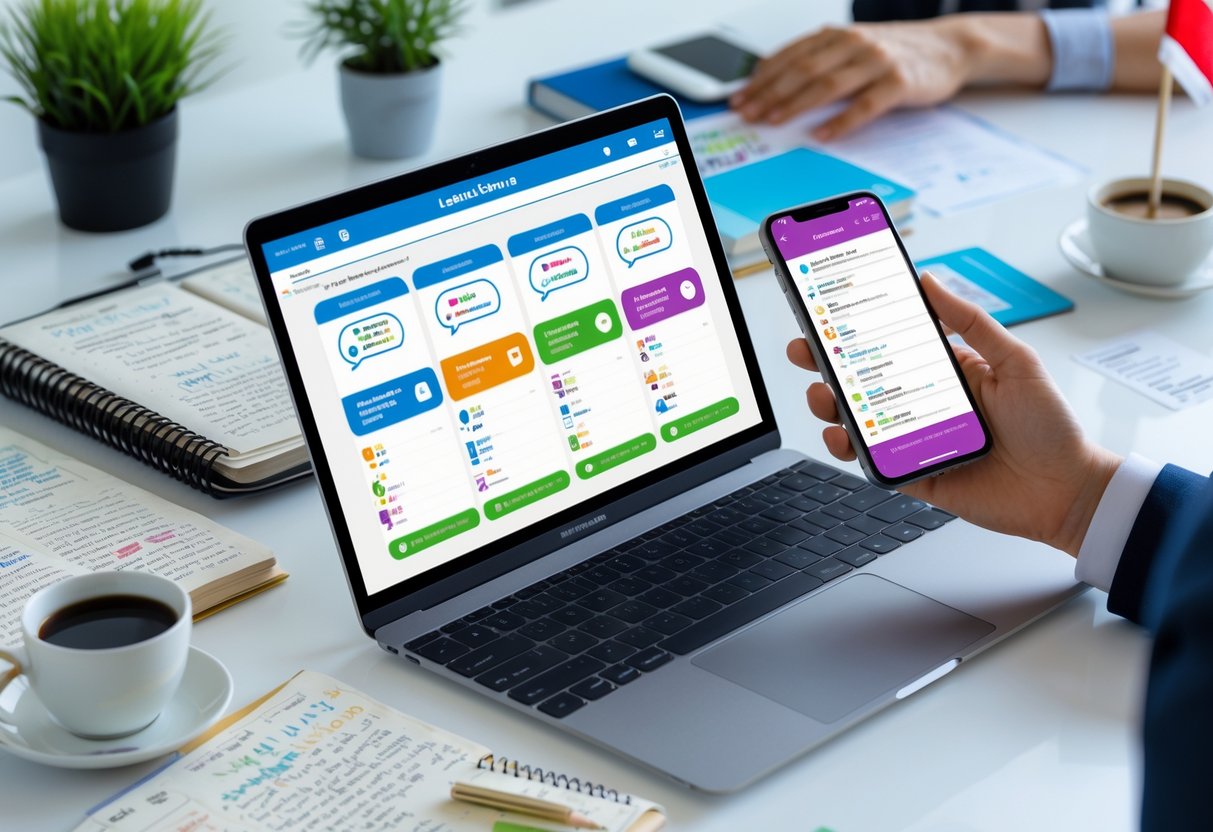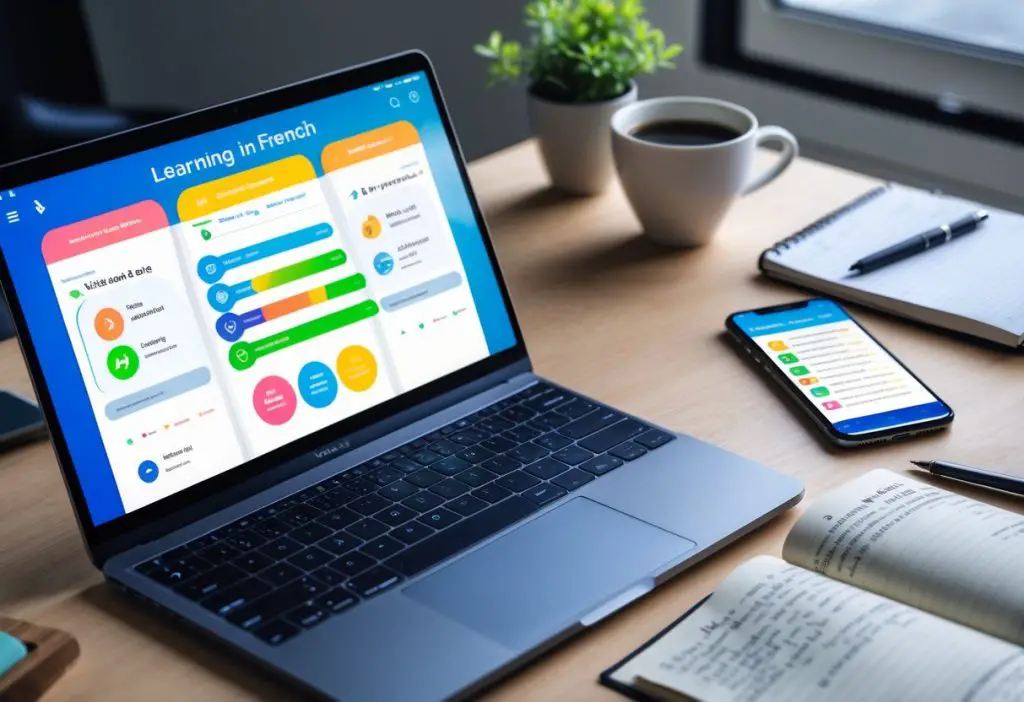Learning French feels easier when the right tools guide the process. Many apps now make it possible to practice vocabulary, grammar, and pronunciation anytime. The best apps for learning French help users build real language skills through consistent, interactive lessons.
Each app offers something different—some focus on speaking, while others emphasize listening or reading. Choosing one depends on personal goals, learning style, and how much time someone wants to spend each day.
With so many options available, knowing which apps truly support progress can save time and frustration. The following guide highlights trusted tools that make learning French more effective and enjoyable.
Key Takeaways
- Learn what makes a French learning app effective.
- Discover top-rated apps that improve French skills.
- Understand which features support steady language progress.
Top-Rated Apps for Learning French

Modern French learning apps combine interactive lessons, real conversations, and personalized tools. They help users practice reading, listening, speaking, and writing through methods such as gamification, audio lessons, and community feedback.
Duolingo: Gamified French Lessons
Duolingo uses short, game-like exercises that make learning French feel interactive. Each lesson introduces vocabulary and grammar through matching, translation, and speaking tasks. The app rewards progress with points and streaks, helping users stay consistent.
Learners can set daily goals and track their improvement. The app’s adaptive system adjusts difficulty based on performance.
Pros: Free version available, bite-sized lessons, fun design.
Cons: Limited grammar explanations, repetitive exercises.
Duolingo works best for beginners who want to build a daily habit and practice in short sessions.
Babbel: Structured Learning Approach
Babbel offers organized French lessons designed by language experts. Each course builds on previous lessons, covering vocabulary, grammar, and conversation topics.
The app focuses on real-life dialogues, helping users learn phrases used in daily situations. Lessons last about 10–15 minutes, making them easy to fit into a routine.
Pros: Structured progression, grammar focus, speech recognition.
Cons: Subscription required, limited free content.
Babbel suits learners who prefer a guided path with clear explanations and practical examples.
Rosetta Stone: Immersive Experience
Rosetta Stone teaches French through full immersion, using only French words and images. It trains users to think in French without translating.
The app emphasizes pronunciation with its TruAccent speech recognition tool. Lessons focus on listening and speaking, improving comprehension, and fluency.
Pros: Immersive method, strong pronunciation practice, and offline mode.
Cons: Slower progress for beginners, higher cost.
Rosetta Stone fits learners who want a deep, immersive experience and are comfortable learning through context.
Busuu: Community and Feedback
Busuu combines structured lessons with community interaction. Users complete grammar and vocabulary exercises, then practice with native speakers who correct their writing and pronunciation.
The app includes personalized study plans and progress tracking. Lessons align with the Common European Framework of Reference (CEFR) levels.
Pros: Native speaker feedback, structured courses, and offline mode.
Cons: Some features require premium access.
Busuu benefits those who value human feedback and want to practice real communication.
Pimsleur: Audio-Based Learning
Pimsleur focuses on spoken French through 30-minute audio lessons. Users listen, repeat, and respond to prompts that simulate real conversations.
The method builds listening comprehension and pronunciation skills over time. Lessons can be done hands-free, making them ideal for commuting or multitasking.
Pros: Strong speaking practice, convenient audio format.
Cons: Limited reading and writing practice, subscription fee.
Pimsleur suits learners who prefer auditory learning and want to improve their conversational ability.
Tandem: Language Exchange with Native Speakers
Tandem connects learners with native French speakers for text, voice, or video chats. The app enables users to exchange languages—each person teaches their native tongue while learning another.
It includes built-in translation, correction tools, and topic suggestions. Users can search by language level and interests.
Pros: Free conversation practice, cultural exchange, flexible use.
Cons: Requires self-discipline, variable partner quality.
Tandem works best for learners who enjoy social interaction and want real-world speaking experience.
Drops: Visual Vocabulary Practice
Drops uses colorful visuals and fast-paced mini-games to teach French words and phrases. Lessons last only five minutes, focusing on vocabulary retention through repetition and imagery.
The app avoids long explanations, making it easy to use daily. It covers topics like food, travel, and everyday objects.
Pros: Quick sessions, strong visual design, fun interface.
Cons: Limited grammar practice, subscription for full access.
Drops fits visual learners who want to expand their vocabulary in short bursts.
MosaLingua: Spaced Repetition System
MosaLingua uses a spaced repetition system (SRS) to help users remember vocabulary long-term. It reviews words just before they are likely to be forgotten.
Lessons include dialogues, flashcards, and audio recordings by native speakers. The app also offers grammar and culture notes.
Pros: Effective memory system, offline use, real-life content.
Cons: The Interface feels dated, with less visual appeal.
MosaLingua is ideal for learners focused on vocabulary retention and practical usage.
Memrise: Engaging Flashcards
Memrise combines flashcards with video clips of native speakers. It teaches vocabulary and common phrases in context.
Users can choose from different levels and topics, and the app uses spaced repetition for review. Short quizzes and listening tasks reinforce learning.
Pros: Real-life videos, adaptive review, free version.
Cons: Limited grammar coverage, some user-made courses vary in quality.
Memrise suits learners who enjoy visual and auditory input while learning everyday French.
LingQ: Reading and Listening Practice
LingQ centers on reading and listening to authentic French content. Users choose from articles, podcasts, and stories, then save new words for review.
The app tracks known and unknown words, creating personalized vocabulary lists. Learners can import their own materials to study.
Pros: Real content, flexible learning, useful tracking tools.
Cons: Requires self-motivation, less structured lessons.
LingQ fits independent learners who prefer learning from real-world materials.
Beelinguapp: Bilingual Stories
Beelinguapp teaches French through side-by-side bilingual texts. Users read stories in French and their native language at the same time.
Audio narration helps improve pronunciation and listening skills. The library includes news, short stories, and children’s books.
Pros: Bilingual reading format, audio support, varied topics.
Cons: Limited grammar instruction, smaller library for advanced users.
Beelinguapp is best for learners who enjoy reading and want to build comprehension through stories.
Anki and Brainscape: Advanced Flashcards
Anki and Brainscape use customizable flashcards based on spaced repetition. Users can create their own decks or download shared ones for French vocabulary and grammar.
Both apps adjust review timing to strengthen memory. Anki offers more flexibility, while Brainscape provides a cleaner interface and progress tracking.
| Feature | Anki | Brainscape |
|---|---|---|
| Customization | High | Moderate |
| Interface | Basic | Modern |
| Price | Free | Freemium |
These apps suit learners who want full control over their study material and efficient vocabulary review.
Rocket Languages: Comprehensive French Courses
Rocket Languages offers full French courses with lessons on speaking, grammar, culture, and writing. Each module includes interactive audio, quizzes, and pronunciation practice.
The app emphasizes practical conversation and cultural understanding. Speech recognition tools help users refine pronunciation.
Pros: Complete course content, offline access, lifetime purchase option.
Cons: Higher price, slower pace.
Rocket Languages suits learners seeking a thorough, structured program that covers all language skills.
HelloTalk: Conversational Practice
HelloTalk connects learners with native French speakers for text, voice, and video exchanges. Built-in correction tools and translation features make communication easier.
Users can post updates or questions for the community to comment on. The app encourages daily conversation practice with real people.
Pros: Free interaction, cultural learning, and active community.
Cons: Requires time to find good partners, can be distracting.
HelloTalk works well for learners who want practical conversation and cultural exposure.
Français Authentique: Real-Life French Content
Français Authentique offers podcasts, videos, and courses focused on natural spoken French. It helps learners understand everyday speech and expressions used by native speakers.
The content avoids translation, encouraging comprehension through context. Lessons often include cultural insights and pronunciation tips.
Pros: Authentic language, clear explanations, free materials available.
Cons: Best for intermediate learners, limited structured grammar.
Français Authentique suits those who want to move beyond textbook French and understand how the language sounds in real life.
Key Features to Look for in French Learning Apps

Strong French learning apps combine interactive practice, spaced repetition systems, and clear grammar guidance. They also create chances to speak with native French speakers, helping learners build real-world communication skills.
Interactive Lessons and Practice
Interactive lessons keep users engaged by encouraging active participation instead of passive reading. Apps with listening, speaking, and writing exercises help learners use new words and phrases in context. This approach builds confidence and improves memory.
Good apps often include audio clips, quizzes, and short dialogues. These tools allow learners to test their understanding and receive instant feedback. Features like drag-and-drop activities or voice recognition make practice more dynamic.
Learners benefit most from lessons that adapt to their skill level. Adaptive learning paths adjust content difficulty based on performance, ensuring steady progress without frustration.
| Useful Interactive Tools | Purpose |
|---|---|
| Audio dialogues | Improve listening and pronunciation |
| Quizzes and games | Reinforce vocabulary and grammar |
| Voice recognition | Practice speaking and get feedback |
Spaced Repetition for Vocabulary Retention
Spaced repetition helps learners remember French vocabulary more effectively. It works by reviewing words at increasing intervals, which strengthens long-term memory. Apps that use this method reduce the need for constant repetition.
A spaced repetition system (SRS) tracks which words a learner struggles with and schedules them for review at the right time. This makes study sessions shorter but more efficient.
Some apps display progress charts or streaks to motivate consistent practice. Others allow users to create custom flashcards for specific topics, such as travel or food.
Key advantages include:
- Better long-term recall
- Less time spent reviewing known words
- Personalized vocabulary lists
French Grammar and Pronunciation Support
Understanding French grammar and pronunciation is essential for clear communication. Apps that explain grammar rules in simple terms help learners form correct sentences. Many include examples showing how verbs, adjectives, and nouns change in different contexts.
Pronunciation tools often use speech recognition or phonetic guides to improve accuracy. Listening to native French audio and repeating words helps learners notice subtle sound differences.
Some apps provide short grammar lessons followed by quick practice tasks. This structure allows learners to apply rules immediately, reinforcing understanding through use rather than memorization.
Opportunities for Speaking with Native French Speakers
Speaking practice is vital for fluency. The best apps connect learners with native French speakers through chat, voice calls, or video sessions. This real interaction builds confidence and improves pronunciation naturally.
Language exchange apps pair users who want to learn each other’s languages. For example, a French speaker learning English can practice with an English speaker learning French. Both benefit from the exchange.
Apps that include guided conversation topics or teacher-led sessions make speaking practice easier for beginners. Regular interaction with native speakers helps learners understand real accents, slang, and everyday expressions.
Frequently Asked Questions
Different French learning apps fit various needs, from beginners to travelers. Some focus on grammar and vocabulary, while others help with speaking, listening, and cultural context.
What are the top-rated French learning apps for beginners?
Beginners often start with Duolingo, Babbel, or Busuu.
These apps use short lessons and clear progress tracking to build basic vocabulary and grammar.
They also include audio examples to help learners practice pronunciation early.
Which French learning app is best suited for intermediate learners?
Babbel and Lingvist work well for intermediate learners.
They offer structured lessons that review previous material and introduce more complex sentence patterns.
Users can focus on conversational skills and grammar accuracy.
Are there any comprehensive apps for learning French that are free?
Duolingo and Memrise provide free versions with solid language coverage.
They include vocabulary drills, listening exercises, and reading practice.
Some features, like offline access or advanced lessons, may require a paid upgrade.
What is the most effective app for learning French while traveling?
Pimsleur and Rosetta Stone are strong choices for travelers.
They emphasize listening and speaking, which help users handle real-life conversations.
Both apps work offline, making them practical during trips.
Can you recommend French learning apps that are popular among students?
Students often use Duolingo, Quizlet, and Busuu.
These apps fit study schedules and include gamified elements that keep learning consistent.
Teachers sometimes use them for class assignments or extra practice.
How does Duolingo compare with other French learning apps?
Duolingo offers an easy entry point with short, game-like lessons.
It focuses more on vocabulary and reading than on speaking fluency.
Other apps like Babbel or Pimsleur provide deeper grammar instruction and more natural conversation practice.

